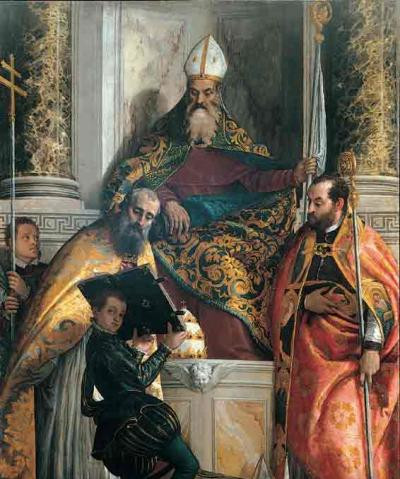
Saint of the Day for 16 September: Sts Cyprian and Cornelius
Cyprian and Cornelius, martyrs in defence of the faith
Name
Sts Cyprian and Cornelius
Title
Martyrs
Recurrence
16 September
Martyrology
2004 edition
Prayer
O God, who gave your people Saints Cornelius and Cyprian, generous shepherds and intrepid martyrs, by their help make us strong and persevering in the faith, to collaborate assiduously in the unity of the Church. Through our Lord Jesus Christ, your Son, who is God, and lives and reigns with you, in the unity of the Holy Spirit, for ever and ever.
Saint Patron of
Cerro Maggiore, Albano Sant’Alessandro, Carnate, San Cipriano Picentino, Vaiano Cremasco, Artogne, Taibon Agordino, Calcata, Mattie, Borgoratto Mormorolo
Roman Martyrology
Remembrance of the martyred saints Cornelius, pope, and Cyprian, bishop, whose deposition of the former and passion of the latter are commemorated on 14 September, while today the Christian world praises them with one voice as witnesses of love for the truth that knows no yielding, which they professed in times of persecution before the Church of God and the world.
The Saint and Mission
Saints Cyprian and Cornelius represent a significant phase in the definition and orientation of the mission of the early Church. Saint Cornelius, the 21st Pope of the Catholic Church, took a central role in outlining an inclusive mission, emphasising the need to open the doors of the Church to all, even those who had been apostates during the persecutions. His handling of the theological and doctrinal controversies of his time guided the Church towards a more welcoming and merciful approach, favouring unity rather than division. St Cyprian, on the other hand, as bishop of Carthage, played a significant role in stabilising the Christian community in North Africa, contributing greatly to the development of a theological corpus that emphasised the importance of Church unity and the need for strong and compassionate episcopal leadership. Their missions, though in different contexts, were synergistic in their goal: to build a Christian community rooted in charity, mercy and inclusion. Both sought to navigate through the tumultuous waters of theological disputes, emphasising the importance of mutual charity and forgiveness, and guiding the Church through periods of deep internal and external divisions. Their dedication to the mission of the Church was demonstrated not only through their service and leadership, but also through their martyrdom. They accepted the supreme sacrifice with courage and determination, remaining faithful to their mission of bearing witness to the Gospel of Christ even in the face of death. Today, as we reflect on their contribution and sacrifice, we find ourselves admiring their profound commitment to a mission that went beyond themselves, a mission rooted in the proclamation of the Gospel and service to others. They remind us that the mission of the Church is a continuous call to conversion, love and unity, an invitation to live the Gospel radically and sincerely. At a time when divisions seem ever deeper and more insurmountable, the legacy of Cyprian and Cornelius remains more relevant than ever, offering us a vision of a Church and society founded on love, mutual respect and understanding. They call us to a mission of unification, dialogue and bridge-building, in a world that desperately needs witnesses of peace and harmony.
The Saint and Mercy
Saints Cyprian and Cornelius profoundly embody the concept of mercy through their lives dedicated to service and love of neighbour. Both worked in a period of history characterised by deep divisions and persecutions, demonstrating a resilience and devotion that still inspire today. St. Cornelius, elected Pope at a time of great turmoil for the Church, embodied the ideal of mercy through his inclusive attitude, highlighting the need to welcome and reconcile those who had been estranged from the community due to persecution. His papacy marked a significant moment of transition, when mercy and love began to take over from judgement and exclusion. St Cyprian, bishop of Carthage, shared a similar vision, dedicating himself to leading his community with a deep understanding of human nature and its frailties. His emphasis on forgiveness and reconciliation highlighted the power of mercy as an instrument of unification and healing. Both demonstrated great mercy at the moment of martyrdom. St Cyprian, before being executed, offered generous forgiveness to his persecutors, revealing a mercy that goes beyond rancour and hatred. St Cornelius, too, met his death with a serenity born of deep faith and compassion for his neighbour. Their dedication to mercy, not just as a theological principle but as a living, breathing practice, laid the foundation for a more welcoming and loving Church. Their lives and martyrdom are a powerful reminder of the power of mercy, the ability to overcome deep divisions and create a more united and compassionate community. As we remember Saints Cyprian and Cornelius, we are called to reflect on our own personal commitment to mercy. Their example spurs us to look beyond our differences, to welcome others with an open heart and to practise forgiveness in an authentic and profound way. The figures of Cyprian and Cornelius remind us that the path of mercy is not only a courageous choice, but also a path of deep spirituality and authentic transformation, where God’s grace can work through us to bring healing and reconciliation.
Hagiography
“The Lord builds his Church on one; even though after his resurrection he confers equal power on all the apostles. How then can he believe he possesses the faith who does not maintain the unity of the Church?” Cyprian of Carthage was a famous rhetorician who converted to Christianity around 246. His intellectual and social position favoured his ordination as a priest and…
